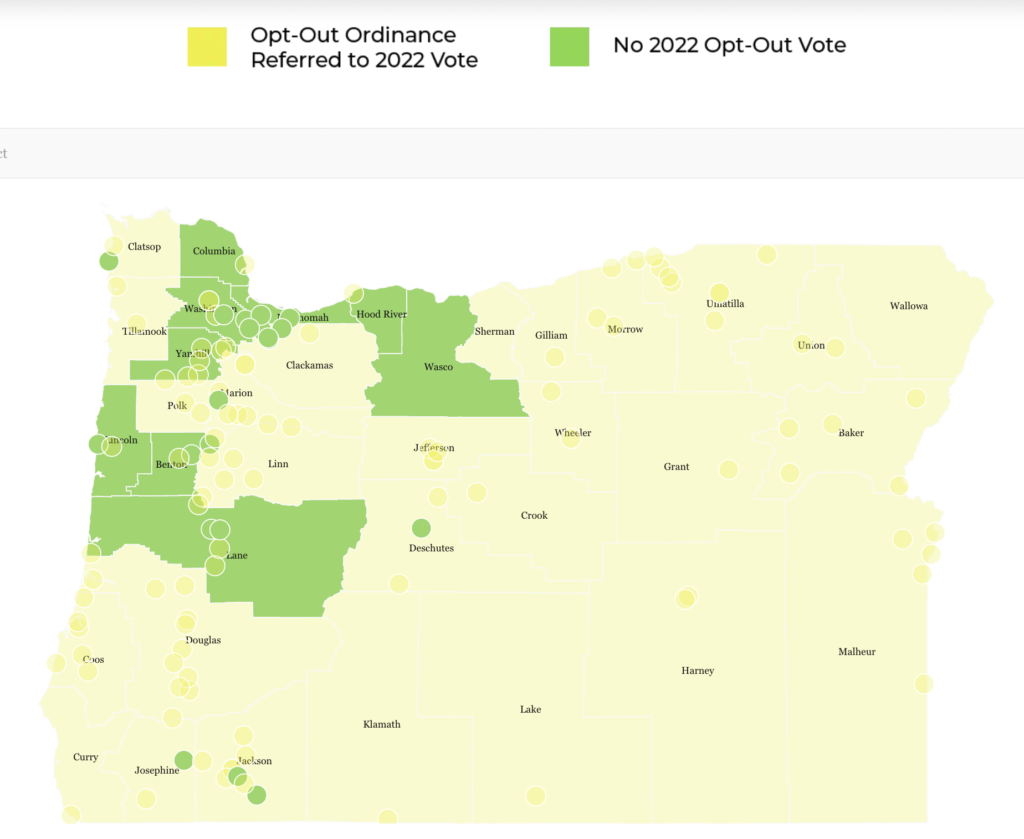This time it’s local: Two-thirds of Oregon counties will decide whether to allow or ban therapeutic psilocybin.
In 2020, Oregon made history when voters passed Measure 109, which would legalize the medical use of psilocybin under the care of a licensed facilitator. It passed with 56% of the vote.
Yet this November, exactly two years later, residents of two-thirds of Oregon’s 36 counties will vote to ban psilocybin therapeutic centers, or implement a two-year moratorium on those services. Local governments retain the power to put such a vote on the ballot.
None of the state’s ten largest cities will vote to opt out. That means psilocybin therapeutic centers will be allowed in cities like Portland, Eugene, Salem, and Bend.
Information about which Oregon cities and counties will consider medical psilocybin opt-out votes on Nov. 8 has been collected into a map, below, by Psychedelic Alpha, Emerge Law Group, and Calyx Law.
Who’s voting on medical psilocybin on Nov. 8 in Oregon

Similar to cannabis opt-out clauses
The state’s psilocybin opt-out policy is consistent with most states’ cannabis legalization laws: Residents can vote to ban sales, but not re-criminalize possession.
In the case of Oregon, in 2020, voters also passed Measure 110, which decriminalized the possession of small amounts of all drugs.
This August, the Oregon Health Authority (OHA) finished rolling out their remaining proposed rules for the program, including advertising policies, safety guidelines to ensure patients travel home safely, licensing fees, and more. Measure 109 requires OHA to finalize program rules by January 1, 2023. Insiders expect the program to launch later in 2023.
Read on to learn more about the opt-out process, which counties will vote on Nov. 8 to opt-out or delay the program, and the proposed rules themselves.
Related
Where are psychedelics legal or decriminalized in the US?
Why is opting out even an option?
According to Sam Chapman, campaign manager for the successful Measure 109 campaign, the controversial initiative would have faced slimmer chances of passing in 2020 without the option to opt out.
“Including the opt-out option was a political calculation we made. We were thinking: What type of opposition might show up during the campaign if we don’t do this?” Chapman told The Microdose newsletter last month, adding that “people will fight tooth and nail” to defeat campaigns that attempt to overrule local government.
In a recent interview with Oregon Capital Chronicle, Chapman empathized with the counties that didn’t vote in favor of Measure 109 that now seek to opt-out.
“It’s not surprising to me that there are a handful of cities and counties that voted against Measure 109 and still don’t want it in their community,” Chapman said. “That’s totally fair. That makes sense to me. And they should have that ability.”
Related
Leafly Report: ‘Opt-out’ towns are encouraging illegal marijuana sales
Yet when it comes to counties that did vote in favor of Measure 109, where local leaders nonetheless put opt-out or a moratorium on the November ballot, Chapman struck a different tone.
“What doesn’t make sense to me is elected officials who know how their county or city voted on Measure 109 refusing to educate themselves on the issue and then sending it back to the voters. I think that’s probably not going to be a good look when the voters decide that they still want this program,” Chapman said.
Opt-out votes can have unintended consequences. As authors Bruce Barcott and Beau Whitney discovered in Leafly’s recently published Opt-Out Report 2022, localities that prohibit state-regulated cannabis retail stores tend to protect and encourage their local illicit marijuana market. Whether such correlations will hold true with psilocybin, however, remains to be seen. Furthermore, the comparison may not even apply, since any psilocybin consumption outside of state-sanctioned treatment would thus qualify as illicit.
Related
Oregon just legalized medical psilocybin. Here’s what happens next
What are the rules for Oregon’s psilocybin medicine program?
After Oregon voters passed Measure 109 in 2020, OHA began working with the newly-formed Oregon Psilocybin Advisory Board to draft rules for the program. Those rules have been released piecemeal throughout this year. In late August, OHA unveiled their final batch of proposed rules.
Those rules include these highlights:
- Therapeutic centers may only have up to 100 grams of psilocybin on site at any given time, and manufacturers may only possess twice that—200 grams—at a time.
- A “serving” of psilocybin may not exceed 25 milligrams. The rules permit smaller doses, too. A patient cannot consume more than two “servings” during a session.
- Group sessions are permitted.
- Licensing fees include $10,000 for manufacturers, service centers, and labs. A facilitator license costs $2,000. The state offers a 50% discount for some qualifying applicants,
- Manufacturing facilities, testing labs, and service centers cannot share their locations with a medical or adult use cannabis licensee or registrant, a liquor store, health care facility, a restaurant, or a private residence.
- Service centers cannot be located within 1,000 feet of a school or an area zoned as exclusively residential.
- All psilocybin must be cultivated within Oregon. Service centers may not give it away for free.
Interested readers can find a summary of the proposed rules written by attorney Vince Sliwoski here.
By submitting this form, you will be subscribed to news and promotional emails from Leafly and you agree to Leafly’s Terms of Service and Privacy Policy. You can unsubscribe from Leafly email messages anytime.

